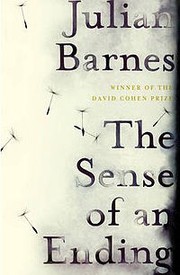OK I GIVE UP
The Sense of an Ending

This might be my most insecure review, because The Sense of an Ending has won a Booker award. Some of my favorite novels, e.g. Midnight’s Children, have won this award, and I find it impossible to place this novel anywhere near them. It’s not a bad novel; the expertise of the author is obvious from the first sentence. The writing is economic, effective and funny at the same time. One could argue that too many British mannerisms are used, but it is a novel told by a Brit, after all. So what’s wrong with it? The story can be divided into three phases: First is introduction to the the protagonist Tony Websters’s clique and how Adrian Finn, a new boy, joins them. The purpose of this section is to set up the characters and some themes (such as suicide and non-marital sex) that will come to be of importance later. Despite the clique consisting of three people, the characterization of the two other than the protagonist is left very superficial and it is impossible to make a picture of these characters.
The second part is the story of how Tony, just like all his other friends, goes to college, and gets into a relationship with a girl named Veronica Ford. This relationship does not work, however, and Veronica ends up getting together with Adrian, through a combination of awkward misunderstandings caused mainly by Tony. The depiction of the stiffled sexual atmosphere of the sixties in this section is really good, and the unsatisfied sexual tensions in the relationship of Tony and Veronica is palpable. It is also strangely understandable that Veronica would go to Adrian, because Tony is lacking the self-confidence and composure to be with a girl, at that age at least.
The final part is the exposition of the “ending” in the title. Tony is now in our time and a retired man living what could only be called a boring life. He receives a letter from Veronica’s mother’s lawyer, and this event triggers an exposition of the “ending” in the title. In all of the novel, but especially in this last part, the reader very clearly knows that an “ending” is coming, and what she is reading is a buildup for it. There is no real development, though, neither in characters, nor in the world they live in - the protagonist even makes fun of “character development” at some point. There is actually not enough space for development, as this is a rather slim novel, not that I have anything against it, but the mastery would have been in leaving room for development in such small space. And when the “ending” which was the driving force behind the whole narrative comes, it’s actually rather anti-climactic. In fact, I couldn’t believe that was the ending, and had to search on the net to make sure I wasn’t missing something, and there was a connection I couldn’t make. Poor Tony, who is treated rather miserably by Veronica and told that he is stupid and not understanding things, ends up being only indirectly responsible for the way things end, but the reader is still left with a mixture of pity and disdain for him.
The problem with the book is that everything is directed towards the ending; the energy of the book derives from going there. But the ending just doesn’t deliver, and it’s neither original, nor imaginative, nor forceful. The user is left with the question of why she read through a story that had little more than humor to make it attractive.
Or I’m missing something.